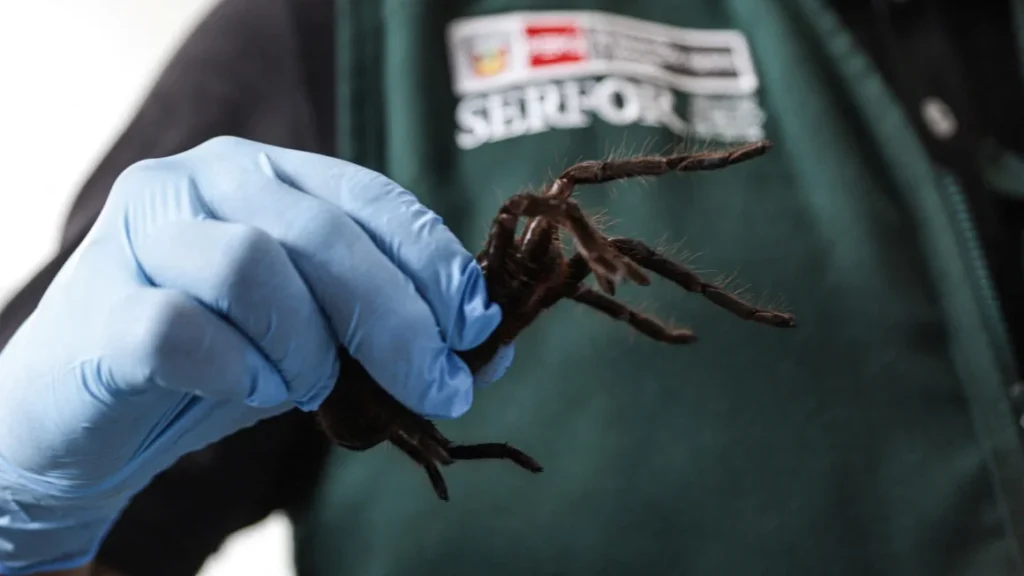
Smuggler Arrested with 300 Tarantulas Strapped to His Body
Introduction to the Arrest
In a shocking incident, a smuggler was apprehended by authorities while attempting to smuggle 300 live tarantulas strapped to his body. The rare and dangerous creatures were concealed in bags and wrapped around his torso, an unusual and highly illegal attempt to transport wildlife across borders. This bizarre smuggling case has raised alarm over the illegal trade of exotic animals.
How the Smuggling Attempt Was Discovered
The smuggling attempt came to light when customs officials at a border checkpoint became suspicious of the individual’s behavior. After a thorough search, authorities discovered the 300 tarantulas concealed under his clothes. The smuggler, who was attempting to transport the spiders illegally, was arrested on the spot. Officials have since stated that the man was planning to sell the tarantulas in a black market deal.
Implications of Tarantula Smuggling
Smuggling rare and exotic animals like tarantulas is a growing problem, posing a serious threat to both biodiversity and the environment. The illegal wildlife trade often involves the exploitation of endangered species, which could lead to ecological imbalances. In this case, the smuggling attempt puts both the tarantulas and the general public at risk, as transporting such creatures without proper regulation can lead to disease transmission.
Legal Consequences for the Smuggler
The smuggler now faces severe legal repercussions for his actions. Wildlife smuggling is a serious crime in many countries, and penalties often include heavy fines and lengthy prison sentences. This case serves as a stark reminder of the ongoing battle against wildlife trafficking, a criminal industry that endangers species worldwide.
Efforts to Combat Wildlife Smuggling
Authorities are continuing their efforts to combat wildlife trafficking through stricter enforcement and public awareness campaigns. This latest arrest underscores the importance of vigilance at border checkpoints and the ongoing need to curb the illegal wildlife trade.
The Role of Customs and Border Protection
Customs and border protection officers play a crucial role in preventing the illegal trafficking of wildlife. They are trained to spot unusual behaviors and potential threats, such as the case of the tarantula smuggling attempt. Increasingly sophisticated techniques are being implemented to detect hidden wildlife, and this arrest highlights the importance of these checkpoints in protecting ecosystems from illegal trade.
The Illegal Tarantula Trade
Tarantulas, particularly rare species, are in high demand in the illegal pet trade. Some tarantula species can fetch high prices on the black market due to their scarcity or exotic appeal. However, the trade of these animals without proper permits and regulation is harmful to their populations, often resulting in the capture of animals from their natural habitats and putting species at risk of extinction.
The Dangers of Smuggling Exotic Animals
Smuggling exotic animals poses several risks, not only to the animals but also to human health and safety. Some species, including certain types of tarantulas, may carry diseases or toxins that can be dangerous to humans. Additionally, the illegal transportation of live creatures often involves poor conditions, leading to stress, injury, or death of the animals. It is essential that authorities continue to crack down on these operations to prevent harm to both the creatures and public safety.
Public Awareness and Conservation Efforts
Public awareness campaigns are essential in educating people about the dangers of wildlife trafficking and the importance of supporting conservation efforts. Organizations worldwide are working to raise awareness and encourage individuals to report any suspicious activities related to the illegal wildlife trade. Additionally, conservation programs that focus on protecting endangered species and their habitats play a significant role in reducing the demand for trafficked animals.
Conclusion: The Fight Against Wildlife Smuggling
This incident of a smuggler arrested with 300 tarantulas strapped to his body serves as a stark reminder of the dangers posed by the illegal wildlife trade. It emphasizes the need for continued vigilance, both from authorities and the public, to prevent such illegal activities and protect the planet’s biodiversity. As awareness of the issue grows, stronger regulations and enforcement are expected to play a key role in combating wildlife trafficking globally.


